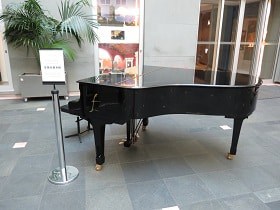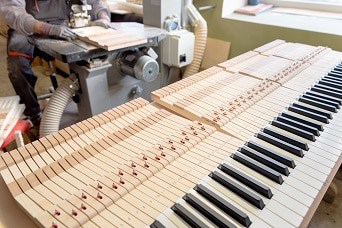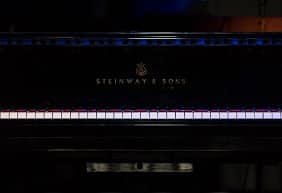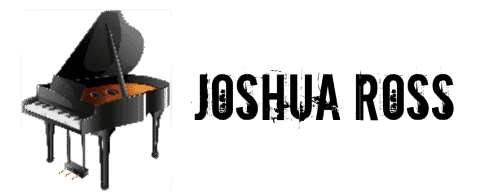As an Amazon Associate I earn from qualifying purchases.
When I first started taking piano lessons I knew that I needed to eventually purchase a real acoustic piano of my own. I researched several brands and found myself wondering why are pianos were so expensive. Knowing how to buy a piano is important because it can help you save money in the long run.
So, why are pianos so expensive? Pianos are a labor-intensive instrument to construct. They contain thousands of delicate parts that control the overall function of the instrument. The wooden case, soundboard, and cast iron plate are also very expensive. Branding and reputation play a major factor in the overall cost of pianos.
That’s just the basics about what makes pianos really expensive. Let’s dig a little deeper into the process of how a piano is built, and also what makes the materials a piano is built with so expensive to use. After that, I’ll share some tips on how to save on a good quality piano.
Want to Learn Piano?Click Here

Pianos Take At Least A Year To Construct

While the actual parts of the piano are expensive, they probably are not worth as much as the time put into them. A typical grand piano like a Steinway takes at least one full year to construct.
There is a lot that factors into that year of construction. Mostly the fact that quality pianos are almost always made by hand. There is very little machinery that goes into the process, even for pianos produced on a mass scale.
Things such as shaving down the wood, bending it against the piano frame and gluing the strips together can take a substantial amount of time. Technicians have to perform accurate measurements and spend a great deal of time perfecting the instrument.
If you choose a piano with custom engraving and art cases, then it can take even longer. Generally speaking, the larger the piano, the more work involved.
It’s important to remember that the people building a piano are experts. They have been trained in the tradition of piano building for years, and are very skilled in carpentry.
Because of this, those workers need to be paid well for the level of work they put into each instrument. A piano cannot just be built by anyone; especially if you want it to be of a certain quality and consistency.
Pianos Are Built With Expensive Materials
The materials that a piano is built with has an enormous impact on the sound quality of the instrument. This includes the wood, action parts, strings, keyboard. Let’s take a look at how the wood of a piano affects the cost.
The Piano Wood
Pianos like Steinway, Yamaha, Kawaii, and Brodmann just to name a few use very delicate woods in their construction. For example, Steinway uses Canadian maple wood and Alaskan spruce in its construction.
The wood is harvested from very specific locations, and in most cases, the source of the wood is replanted. The trees have to be a specific age and readiness in order to be used in most pianos.
A majority of the wood is located in the outer case of the piano. This alone can drive up costs depending on how thick the case is. Pianos with rich and balanced sound like Steinways, Bosendorfers, and Yamahas tend to have the thicker casings. As a result, the price is higher.
Action Parts
The piano is made up of over 12,000 individual parts! Most of those are located in the action itself. The action includes the keyboard, hammers, rail pins, pistons, dampers, and more.
Many of the parts are made out of wood, felt, brass, and copper metal. An entire set of piano strings cost anywhere from $300 – $500 alone depending on the type of metal used. Copper metal is generally the cheaper option, and steel strings are on the higher end of the spectrum.
The keys, strings, soundboard, and everything inside the piano all have to be expertly installed by the piano technicians. This takes a great deal of time, effort, and accuracy to get right. After that, each one of these parts has to be inspected along the way to make sure everything is in place and not a single piece is missing!
For more details check out this article on how a piano works.
Some Piano Brands Are More Expensive Than Others

The name engraved on the front of a piano means a lot when it comes to pricing. The most popular brands are Steinway and Yamaha, followed by Fazioli, Bosendorfer, Kawaii, and Baldwin.
One can expect to spend on the higher end of the scale for these instruments because of their extensive background and reputation.
These piano brands are also endorsed by performing artists which further affects that formula. Because of branding, piano companies are able to charge more for their instruments.
This does not mean quality drops, however, as these instruments have earned their reputation for a reason.
Most major piano competitions, universities, churches, and performance halls use a select few brands of pianos. Yamaha is known for its consistency in touch and sound, while Steinway is known for its fantastic action and creative capabilities.
While more brands are starting to enter the concert halls these days, these two brands still dominate the stage.
Regardless of brand, one can expect to spend at least $180,000 on a brand new 9′ concert grand. Many of the 7′ pianos average in the $90,000 – $154,000 range. There however is some wiggle room with pianos shorter than 7′.
In today’s world, many more brands are entering the market and attracting customers looking for low-cost options. This makes sense because the average customer is likely to purchase a baby grand piano.
While the heavyweight brands might charge $20,000 – $30,000 for a 5’1 grand piano, it’s not uncommon to find a Brodmann or Young Chang for half of that price.
Many of the less popular brands offer surprisingly good instruments. Some are even outdoing some of the bigger brands in terms of instrument quality and value.
Not All Piano Manufacturers Produce At The Same Rate
While it takes about a year to produce a high-quality piano, not all manufacturers produce instruments at the same rate.
Steinway, for example, is able to produce around 3000 pianos per year from their factories. Compare that to a smaller company such as Fazioli who can only produce a smaller number. Then, of course, there is a brand like Yamaha who produces pianos at an even faster rate.
Like any business, supply and demand and an outlook on the market can greatly affect piano prices.
Some piano builders also take a much longer time prepping their materials before using them in the building process.
An example of this is Bosendorfer aging their wood just a bit longer which costs time and money to do. Those expenses are passed on to the final product. The costs of the materials in the global market also have an effect on instrument prices.
Pianos Are Built to Last
Pianos are built to last. Once you purchase one, it will probably be the last time you ever buy one. A quality grand piano can last an owner in excess of 50 years.
Once the piano does start to experience some serious wear and tear, it will need to undergo a rebuild. While rebuilds are quite pricey, they pale in comparison to the initial investment. if taken care of, the outer casing and soundboard will likely need no repair work done to them.
All that will have to be done is a replacement of the action, keys, and other parts that need to be redone. A piano is an instrument that one generation can purchase, and then pass it down for future generations. Think of it as a longterm investment in music.
Related Questions
Is A Grand Piano Worth It? A grand piano is definitely worth it, especially if you’re a serious pianist. These pianos have the best action, tone quality, and they are built to last. Not all grand pianos are equal though, and they need to be playtested before purchasing.
Is A Grand Piano Better Than An Upright? Yes. Upright pianos are great starter instruments for beginning pianists, but they are not better than grand pianos. The action mechanism is more refined in a grand piano, and the overall sound quality is much better in larger grand pianos 6′ and up.
Are Old Pianos Worth Anything? Depending if the piano is an antique or not, it is certainly worth a lot of money. Pianos do not depreciate as much as a vehicle or electronics would. Depending on the brand, parts such as ivory keys, and the condition of the piano soundboard, your piano might actually be worth more as it ages instead of new.
Hello & thanks for stopping by! I’m a professional concert pianist and piano instructor. In the United States, I’ve given successful performances in several places including New York, Florida, Connecticut, & New Jersey, I have also performed internationally in Italy and made my Carnegie Hall debut in 2014. I enjoy blogging about the piano, the art of performance, general music, current events and the latest in music production.
